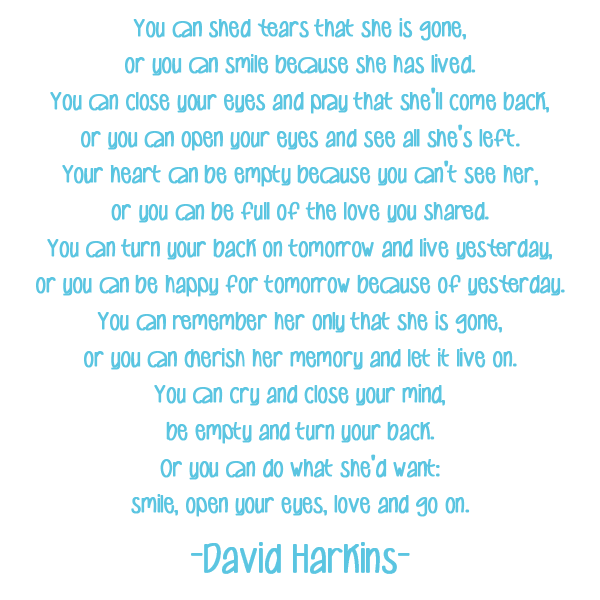I was going through my archives looking for a post to post about Melissa and I found this post. I am not sure where it came from or why I had it as a draft and never published it. I actually think she posted it on her blog but I know that we all can learn something for her while we are mourning her passing.
Grief Has Taught Me A Few Things
Until I began experiencing grief as a result of dad’s death, I never realized anything could feel as emotionally and physically painful as depression. In fact, they have felt so similar that I became confused, and had a difficult time distinguishing the difference between the two. At one point, I even convinced myself that I was heading toward a depressive episode.
I went to my psychiatrist, thinking she was going to raise the dosage of my depression medication, because of how badly I was feeling. Instead, she told me what I was feeling was normal grief, and while it hurt just as badly as depression does, it was not the same thing. She told me to be patient. She told me the worst of what I was feeling would pass in a few weeks. She was right.
She did give me a word of warning, telling me that with my history of depression I would have a greater chance of my grief turning into a depressive episode. Her solution was not to raise my medication dosage, but instead watch me a little more closely than usual.
Now that the pain of dad’s loss is not so intense, I can see the wisdom in what she said. I can also identify some of the differences between grief and depression, as well as acknowledge that I have learned a few things from this experience.
Both grief and depression include symptoms of sadness, tearfulness, disturbances in sleep, decreased socialization, and changes in appetite. In most cases, that is where the similarities end. Usually, after the first two to three weeks of the grieving process the person is – in most cases – able to carry out most of the obligations and activities that come with daily living. However, a person with severe depression will lack the ability to function for many weeks, months, and in some cases years. In addition, early morning awakening is more common in depression.
One of the biggest differences I have noticed between depression and grief is what my mind has focused on. During my severe major depressive episode I spent a lot of time thinking about myself – in a self negating way. Some of my thoughts during that time were that I was “worth nothing”, “a burden”, and “unlovable”. Nothing could penetrate my thoughts of despair, and my inability to have hope. Eventually, the only option I felt was left to me was suicide. In my grieving process, I have been in emotional pain, but there have been no feelings of despair or hopelessness. Nor have I had any negative thoughts about myself or suicidal thoughts.
There is no question that feelings of loss and sadness are a significant part of grief, however, those feelings are distinctly different than feelings of loss and sadness in someone with depression. A person with depression will usually experience a constant and overwhelming feeling of sadness, while someone grieving typically experiences sadness in “waves”. Most of the time, it is in response to some reminder of their loved one.
For me, these painful memories of dad are paired with positive feelings and memories. For example, when I began the process of trying to organize things in the garage I became overwhelmed with grief. Dad’s death was the reason I was having to organize the garage, and get things ready to move. That hurt. I sat down and cried for an hour. When I was able to calm down enough to get back to work one of the first things I found was dad’s coonskin hat. So in the middle of that emotional pain I found something to laugh about. During my depressive episode finding that hat certainly would not have made me laugh, in reality it probably would have caused me to cry even more.
While there have been plenty of times when I have wanted to be alone in my grief, I have noticed that I have not gone to the extremes I did during my depressive episode to isolate myself. I have maintained social contacts, and even reached out to friends and family when I felt overwhelmed by my grief. I have allowed myself to be consoled, something that would have been impossible if what I had been feeling was depression symptoms.
I still miss dad, and I know I always will, but at least I have a professional sport team, my mother, real friends, and online friends to help me through my grieving process.







